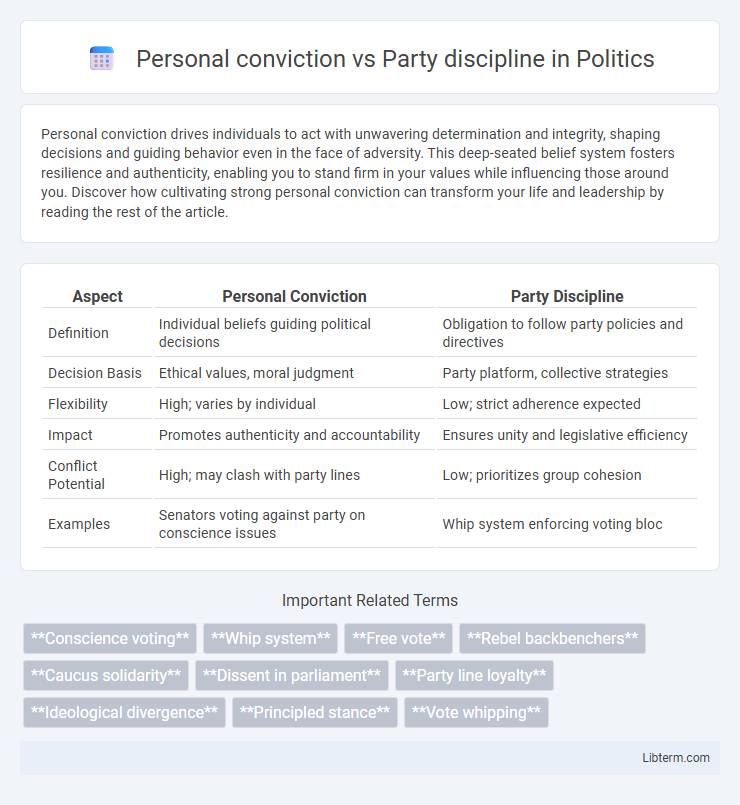Personal conviction drives individuals to act with unwavering determination and integrity, shaping decisions and guiding behavior even in the face of adversity. This deep-seated belief system fosters resilience and authenticity, enabling you to stand firm in your values while influencing those around you. Discover how cultivating strong personal conviction can transform your life and leadership by reading the rest of the article.
Table of Comparison
| Aspect | Personal Conviction | Party Discipline |
|---|---|---|
| Definition | Individual beliefs guiding political decisions | Obligation to follow party policies and directives |
| Decision Basis | Ethical values, moral judgment | Party platform, collective strategies |
| Flexibility | High; varies by individual | Low; strict adherence expected |
| Impact | Promotes authenticity and accountability | Ensures unity and legislative efficiency |
| Conflict Potential | High; may clash with party lines | Low; prioritizes group cohesion |
| Examples | Senators voting against party on conscience issues | Whip system enforcing voting bloc |
Understanding Personal Conviction in Politics
Personal conviction in politics refers to the deep-seated beliefs and values that guide a politician's decisions and actions, often rooted in moral or ethical principles. This internal compass can sometimes conflict with party discipline, which demands adherence to collective strategies and voting lines to maintain political unity and effectiveness. Understanding personal conviction reveals the tension between individual integrity and party loyalty, highlighting the challenges politicians face in balancing authentic representation with organizational expectations.
Defining Party Discipline: Meaning and Importance
Party discipline refers to the expectation that members of a political party adhere to the established policies, decisions, and voting instructions set by the party leadership. It ensures organizational unity, enabling cohesive policy implementation and a stable government structure. Effective party discipline helps avoid internal conflicts, maintains collective responsibility, and enhances legislative efficiency.
Historical Context: Conviction vs. Party Loyalty
Historical context reveals a persistent tension between personal conviction and party discipline, particularly during critical political moments such as the English Civil War and the development of modern parliamentary systems. Figures like Winston Churchill demonstrated how personal conviction could override strict party loyalty, influencing significant policy shifts during World War II. This dynamic underscores the evolving balance between individual principles and collective party strategies in shaping political decision-making.
Key Benefits of Personal Conviction in Governance
Personal conviction in governance fosters authentic decision-making by allowing leaders to prioritize ethical values and long-term societal benefits over party agendas. This autonomy enhances accountability and encourages innovative solutions tailored to constituents' needs. Emphasizing personal belief systems promotes integrity and trust, essential for transparent and effective political leadership.
Advantages of Strict Party Discipline
Strict party discipline ensures cohesive policy implementation and unified legislative action, enhancing governmental stability and decisiveness. It minimizes internal conflicts, streamlines decision-making processes, and reinforces party identity, which strengthens voter trust and electoral success. Strong discipline also facilitates clearer accountability as party members collectively uphold agreed-upon platforms and strategies.
Dilemmas Faced by Politicians: Loyalty or Belief?
Politicians often confront the dilemma of choosing between personal convictions and party discipline, where loyalty to party policies can conflict with individual beliefs. This tension influences decision-making, as deviating from party lines risks political isolation while compromising personal integrity challenges public trust. Balancing these forces is crucial in maintaining both effective governance and authentic representation.
Case Studies: When Conviction Challenged Party Lines
Personal conviction often leads politicians to question or defy established party discipline, as highlighted in key case studies like Senator John McCain's vote against the Republican health care bill in 2017 and UK MP Jo Cox's advocacy for Brexit despite party pressures. These examples illustrate the tension between individual moral beliefs and collective party strategies, impacting legislative outcomes and public perception. Analyzing such instances reveals the critical role of personal conviction in shaping political debates and policy decisions despite risks of party alienation.
The Impact on Democratic Processes
The tension between personal conviction and party discipline profoundly shapes democratic processes by influencing the independence of elected representatives and the quality of legislative debate. Party discipline ensures cohesive policy implementation but can suppress individual lawmakers' authentic viewpoints, potentially diminishing voter representation and accountability. Balancing these forces is essential for fostering a responsive democracy where diverse perspectives inform decision-making without hindering effective governance.
Balancing Individual Ethics and Collective Goals
Personal conviction often challenges party discipline as elected representatives strive to uphold individual ethics while adhering to collective goals set by political parties. Balancing these conflicting demands requires nuanced decision-making that respects moral integrity without undermining party unity or legislative effectiveness. Successful navigation of this tension enhances democratic accountability and fosters public trust in political institutions.
Navigating Conviction and Discipline in Modern Politics
Navigating the tension between personal conviction and party discipline requires politicians to balance adherence to core values with the strategic unity demanded by party agendas. Modern politics increasingly challenges lawmakers to reconcile individual ethical stances with collective party decisions, especially on divisive issues such as climate change policy or social justice reforms. Effective political leadership hinges on finding equilibrium that respects personal integrity while maintaining party cohesion to advance legislative goals.
Personal conviction Infographic

 libterm.com
libterm.com